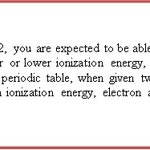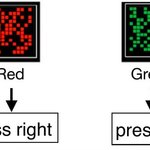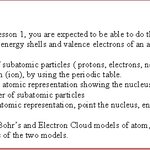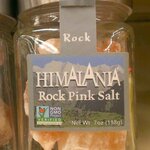Science Education & Policy

This is the second in a series of topics on Chemical Bonds.hibr />
This is intended for use in general chemistry classes. More particularly, for non-chemistry major and high school students.
Why Hank's Campbell's Science 2.0 website? Well, the answer is because of its popularity, my expectations that members in here care to be of help through comments, and more so the publications here are protected by copyright.
TOPIC OUTLINE
LESSON 1 REVIEW ON ATOMIC STRUCTURE AND PERIODIC TABLELESSON 2 PERIODIC TRENDSLESSON 3 ELECTRON CONFIGURATIONSLESSON 4 IONIC BONDSLESSON 5 COVALENT…

Writers, athletes and athletes can tell you that sometimes being too focused in a bad thing. You need to relax a little, especially if, as the old saying goes, being focused causes you to lose sight of the forest among all those trees.
If you are coming out of a New York City subway one late afternoon and you want to find out which way is west you could walk to the next block and scan all of the street signs for the one with a W on it - or you could just look at the setting sun. How the brain switches from an ongoing strategy to a new and perhaps more efficient one is the focus of a new study…
The Australian federal government again failed in its attempt to allow universities to set their own prices for student fees. The key concern with the package was that student fees would rise sharply. However, this is not a necessary outcome of a deregulated university system.
Prices could be pressured to stay low if there were more competition.
The high fees argument is clear. With HECS providing “learn now, pay later” pricing, existing universities, particularly the prestigious Group of Eight, face little constraint on their prices.
So fee deregulation could mean A$100,000 degrees.…

In the 1980s, student loans were not unlimited, there was a cap on how much you could borrow without getting a regular loan from a bank. As a result, colleges and universities kept their costs down.
By the end of the decade, politicians saw a chart showing that people with a college degree made more money than people with a high school diploma. So the obvious solution for politicians was to give students unlimited student loans and secure loyal voters. It certainly worked. Universities now had unlimited funding and in thanks academic representation lurched wildly toward the party that made…

This is the first of a series of lessons about chemical bonds. The purpose of publishing this through Science 2.0 is to solicit comments and suggestions prior to a formal proposal for its use in the general chemistry classes particularly, in the junior high school science. I will appreciate if one can point out any oversimplification that may lead to misconceptions. Another purpose is for this to be used as a review material for non-chemistry major students enrolled in general chemistry.Chemical bonds is one of the topics assigned to Grade 9 Science by the Philippine…

A bipartisan duo has floated the idea of putting an end to having 50 rules for 50 states when it comes to labels on genetically modified foods. The federal government is usually hands off about processes that don't involve safety - they don't do spot testing of organic or kosher food, for example they rely on companies to be honest in filling out paperwork and for the public to be punitive when food makers are unethical. Likewise, GMO is just a process, so the FDA and the USDA hasn't much cared, as long as products show substantial equivalence.
But organic food did not get to be a $105…
The big question in policy circles for the last month has been, would the Obama administration that has repeatedly said that putting solar panels on public land should be allowed side with science or with environmentalists when it came to natural gas?
Though only a small percentage (10%) of hydraulic fracturing - fracking - is on public lands, it would still reverberate to state governments if the administration had evidence that it is harming the environment. The new guidelines, finalized after four years of haggling, instead show that science remained part of the equation. Rather than issue…

The annual Rethink Media conference was held yesterday at Birmingham City University to address the future of the digital landscape and the challenges facing the sector and, predictably, there was plenty of blame to go around, and assurances that the answers were simple - but as usual when panels get together to lament the future, no one was doing anything.
Schools got the brunt of the cultural shame and blame.
“Schools need to fix the fact that technology is not being made aspirational for females”, urged Talk Talk’s Head of Digital, Rahul Chakkara. “Half of the talent is being lost at…

Bans are all the rage in states like California and New York but the key question is whether or not they actually work; the entire developed world is facing an obesity crisis so if bans are the only thing that will prevent a strained health care system from collapsing, advocates for managing individual behavior say they should be used as needed.
There is a test case already. A Los Angeles ordinance designed to curb obesity in low-income areas by banning the opening of new fast-food restaurants didn't reduce fast-food consumption or reduce obesity rates in the targeted neighborhoods, according…

Dr. Harold Roy-Macauley, new Director General of AfricaRice, doesn't want to just improve rice science for Africa, he wants to make the continent a world leader in it.
The rice sector in Africa is going to be “evidenced-based and therefore very solid and powerful,” he says. At a time when the developed world agonizes over the value of science, Africa sees an opportunity to grab a lot of market share by using science to improve their food production and become a next exporter, and then the rest of the world can play catch up.
“Rice is global and it is big business,” said Macauley,a Sierra…